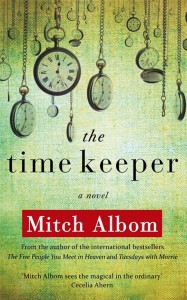“Everything man does today to be efficient, to fill the hour? It does not satisfy. It only makes him hungry to do more. Man wants to own his existence. But no one owns time. When you are measuring life, you are not living it.”
Since time immemorial, man has always been preoccupied with optimising his use of time. He invented innumerable ways to improve efficiency, generate greater returns on time spent, and maximise mileage out of every waking minute.
We’ve all been told to “make time count”, and are reminded that “time and tide waits for no man”. Who can forget Dead Poets Society’s iconic incantations to “seize the day” and “gather ye rosebuds while ye may.”
The value of time is masterfully told by Mitch Albom in his novel The Time Keeper.
Traversing 6,000 years of history, the slim volume chronicles the destinies of ancient inventor Dor (aka Father Time), 17 year old love sick teenager Sarah Lemon, and cancer-stricken billionaire octogenarian Victor Delamonte. Through the twist of fate, the lives of all three are magically woven together as they travel backwards and forwards in time in their quest for meaning.
Inventor of the Clock and Calendar
In the book, Dor was introduced as the inventor of the clock and calendar. Unfortunately, his creation of ways to measure, track and schedule time resulted in mankind becoming obsessed with how he should spend his limited hours.
To “redeem” himself while searching for a cure for his ailing wife, Dor was granted the gift of immortality—and a time-manipulating hourglass—while challenged with a mission to transform the lives of two individuals besotted by the abundance or lack of time.
His life became inter-twined with that of geeky genius Sarah and cash-rich capitalist Victor.
While the theme of travelling through time to change one’s fate isn’t new (think Charles Dickens’ “A Christmas Carol”), Albom’s modern day fable brought fresh contemporary insights to timeless principles. Through his spare and quote-filled narrative, the author got me thinking about the bigger questions on time—and life—management.
Is Immortality a Gift?
First, immortality isn’t necessarily a good thing.
God gave us one life to live here on Earth, and it is up to us how we want to fill it with days full of meaning and passion.
The issue here isn’t how much time we have but what we do with the limited time we have which matters.
Escaping from Our Circumstances
Next, it pays for us to periodically “escape” from our present circumstances and take a higher vantage point.
Instead of lamenting over how hopeless our lives are, we could adopt the guise of the Time Keeper by “freezing” time. We could then reflect more deeply on what the truth behind our situation is while taking a broader, more objective and less impulsive view.
Truth be told, a momentary setback or failure isn’t quite as terrible as what we choose to make it out to be, in the bigger scheme of things.
The True Meaning of Happiness
The meaning of happiness was another theme which emerged from the novel.
In our relentless chase for fulfillment and excellence, we may be so blinded by the world’s definition of success that we fail to treasure what we truly have.
Real joy comes not from a jet setting, globe trotting career, but from making a difference in our communities, homes, and families.
People—And Love—Matters Most
Which brings me to the final and perhaps most important “lesson” from the novel – people matters. When push comes to shove in this crazy world, our family members, friends and loved ones are the ones whom we should appreciate the most.
Without love, and the warm fuzzy glow of endearing relationships, there is little point in trying to scale the dizzying heights of career, academic or material success.
My Thoughts on Time
As a busy professional who is also a husband, parent and blogger, I can certainly appreciate the dilemma of competing concerns.
How do I balance between spending more time in the office to polish a piece of work compared to inculcating important life values to my son?
While blogging may not be that high in my list of life priorities, it provides a vital means to reach more deeply into my thought life, challenging me to expand my horizons beyond my daily routine.
Although The Time Keeper does not provide us with direct answers, it does help us to adopt a different perspective on the value of time.
Life isn’t just about rushing from one appointment to the next, but about savouring the present moment and appreciating what one truly has.
Sometimes, this may inadvertently mean dropping a few balls so that the ones that you keep in the air will truly bring you love, joy, happiness and meaning.
Let me end with another quote from the book. Think about what this means and how you can escape from the stranglehold of “running out of time”.
“Try to imagine a life without timekeeping. You probably can’t. You know the month, the year, the day of the week. There is a clock on your wall or the dashboard of your car. You have a schedule, a calendar, a time for dinner or a movie. Yet all around you, timekeeping is ignored. Birds are not late. A dog does not check its watch. Deer do not fret over passing birthdays. Man alone measures time. Man alone chimes the hour. And, because of this, man alone suffers a paralyzing fear that no other creature endures. A fear of time running out.”



Hi Walter,
This was a good read, I have had similar thoughts , somewhere close to what you have discussed.
Try to Imagine a life without the concept called ‘Time’
Rgds
Anoop
I finished the book a while ago and it does make me think about the subject of …time & .. lifetime. And I agree with your thoughts about balancing.
I have quite a bit of time recently to reflect. I ‘revamped’/ ‘resurrected’ my blog, started drawing/ sketching and set up a Tumblr to archive them – things that I love, enjoyed doing but often finding excuses to neglect in the name of WORK.
Even with new work coming up, I am telling myself to not get suck into the same cycle again and always remember to priortize family, health and ME.